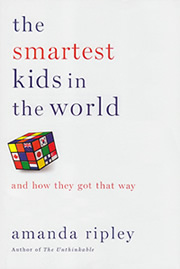For all those who loathed psychologist Peter Gray’s argument for self-directed learning in School is bad for kids, here’s cognitive scientist Dan Willingham’s paean to rigorous curriculum and hard work.
In The Smartest Kids in the World: And How They Got That Way, Amanda Ripley tells the the education success stories of Finland, South Korea and Poland, Willingham writes. In all three countries, students engage “ from an early age, in rigorous work that poses significant cognitive challenge.”

When schoolwork is challenging, students fail frequently, “so failure necessarily is seen as a normal part of the learning process, and as an opportunity for learning, not a cause of shame.”
South Koreans, Finns and Poles expect schoolwork to be hard, Ripley writes.
By contrast, Americans believe “learning is natural” and “should be easy,” Willingham writes. If a student has to try much harder than classmates, he’s a candidate for a disability diagnosis.
Our expectation that learning should be easy makes us fall for educational gimmicks, Willingham writes. “Can’t learn math? It’s because your learning style hasn’t been identified. Trouble with Spanish? This new app will make it fun and effortless.”
Ripley discounts explanations for U.S. students’ mediocre performance on the science and math portions of PISA. Willingham agrees:
Poverty is higher in the U.S. Not compared to Poland. And other countries with low poverty (e.g. Norway) don’t end up with well educated kids. The relevant statistic is how much worse poor kids do relative to rich kids within a country. The U.S fares poorly on this statistic.
The U.S. doesn’t spend enough money on education. Actually we outspend nearly everyone. . .
The US has lots of immigrants and they score low. Other countries do a better job of educating kids who do not speak the native language.
The kids in other countries who take PISA are the elite. Arguably true in Shanghai, but not Korea or Finland, both of which boast higher graduation rates than the US.
Why should we compare our kids to those of foreign countries? Willingham answers: “Because those other kids are showing what we could offer our own children, and are not.”
By the way, Gray panned Willingham’s book, Why Don’t Students Like School?